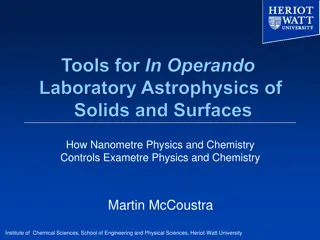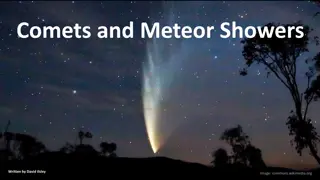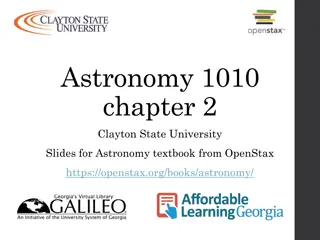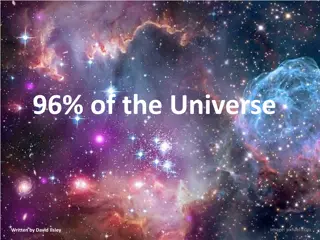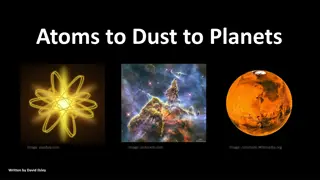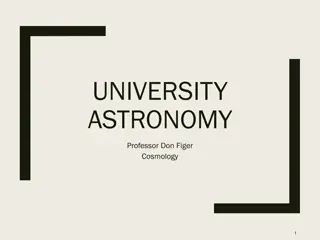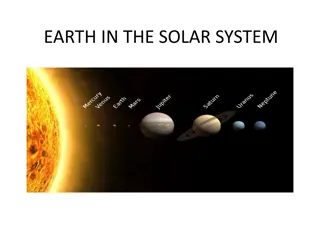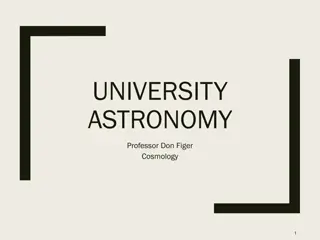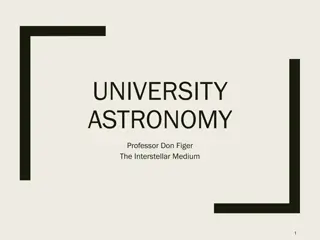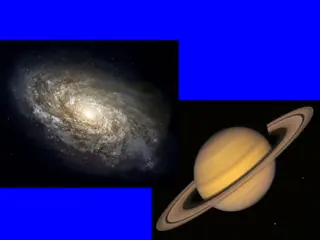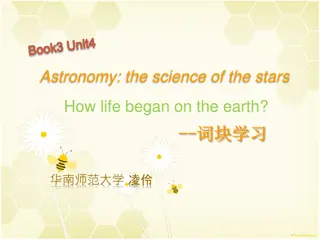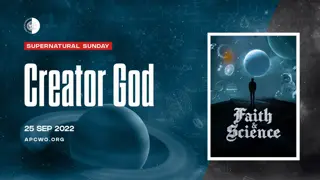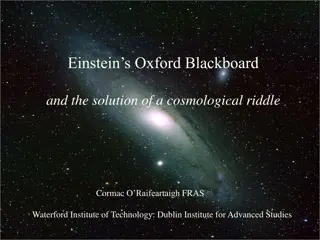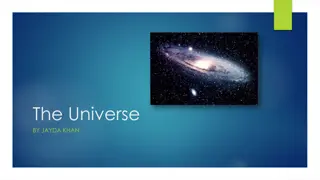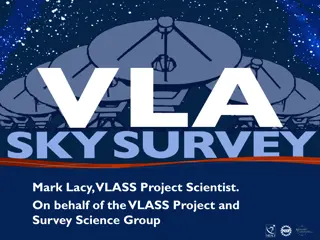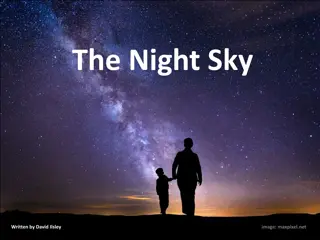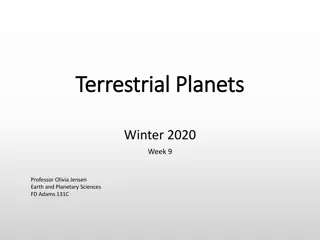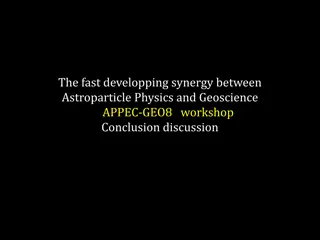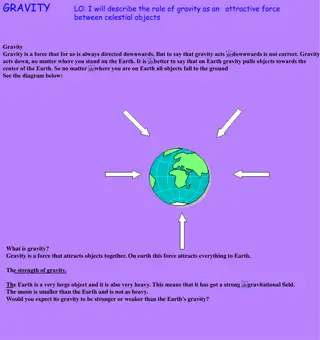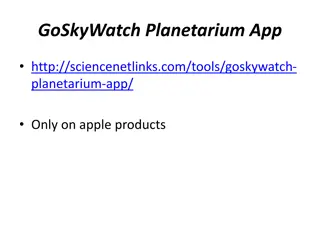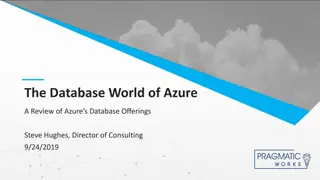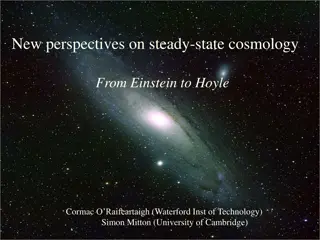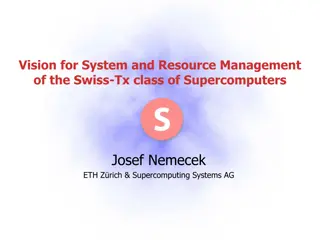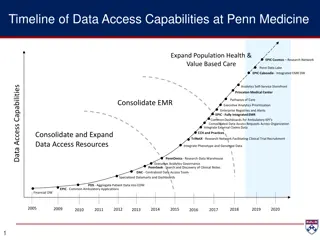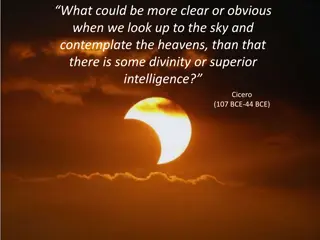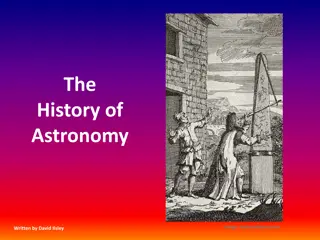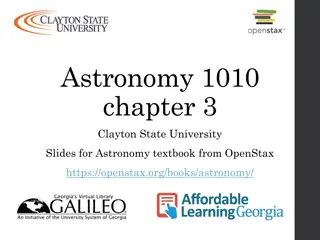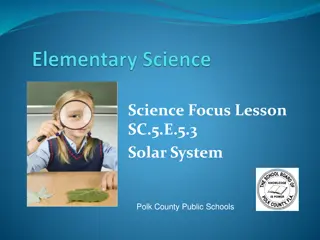Zodiac Birthdate Candle Gift, Birthdate Candle
Unveil the mysteries of the cosmos and celebrate their individuality with the Personalized Zodiac Birthdate Candle! This captivating 9oz candle is the perfect way to acknowledge their astrological sign and embrace the unique qualities it represents. Made with a 100% natural soy wax blend and housed
0 views • 1 slides
Chemically-controlled Cosmos: Insights into Molecular Complexity in Astrophysical Environments
Delve into the intriguing world of the Chemically-controlled Cosmos, where spectroscopic observations reveal over 200 chemical species existing in gas and solid phases. From simple atoms and molecules to complex structures crucial for star formation and potential life seeding, explore the diverse en
8 views • 56 slides
Comets and Meteor Showers
This informative article delves into the fascinating world of comets, from their icy origins to their various locations in the solar system, including the Kuiper Belt and Oort Clouds. Discover the different types of comets, their composition, and the vast distances they travel as they orbit the Sun.
3 views • 29 slides
Ancient Astronomy and Cosmologies Across Different Civilizations
Ancient civilizations like Babylonian, Assyrian, Egyptian, and Chinese had profound knowledge of astronomy, including tracking celestial events, developing calendars, and recording astronomical phenomena. The Greeks contributed to cosmology, contemplating the nature of the cosmos. Beliefs in a spher
2 views • 28 slides
Exploring the Composition of the Universe
The universe is a vast expanse consisting of various components. Only 0.4% comprises galaxies, while hydrogen, helium, protons, neutrons, and electrons make up 4%. The remaining 96% includes photons, neutrinos, dark matter, and dark energy. Photons, fundamental particles of light, exhibit different
0 views • 30 slides
The Building Blocks of the Universe: Protons, Neutrons, Electrons, Atoms, and Beyond
The universe is composed of just seven different things - protons, neutrons, and electrons- the fundamental building blocks of matter. These particles combine to form atoms like hydrogen, helium, and carbon, which are essential components of our bodies. Understanding the structure and properties of
0 views • 37 slides
The Journey of Atoms: From Big Bang to Supernovas
The evolution of atoms, from the creation of quarks and electrons in the Big Bang to the fusion of elements in stars and their explosive dissemination as supernovas, highlights the remarkable process of atom formation and distribution in the universe. Witness the transformation from subatomic partic
0 views • 32 slides
UNIVERSITY ASTRONOMY
Delve into the fascinating realm of cosmology as we unravel the mysteries of the Universe, from its origins with the Big Bang theory to the accelerating expansion and potential fate of the cosmos. Discover the history of cosmological thought, from Aristotle to Newton, and ponder profound questions a
0 views • 50 slides
Understanding Celestial Bodies and Constellations in the Universe
Explore the fascinating world of celestial bodies in the universe, including stars, galaxies, planets, and constellations. Learn about the formation of stars, the structure of galaxies like the Milky Way, and how constellations have been observed and named throughout history. Discover the significan
0 views • 28 slides
Exploring Cosmology: A Journey Through the Universe's Mysteries
Delve into the fascinating field of cosmology with Professor Don Figer as he unravels the big bang theory, cosmological observations, and ponders the fate of the Universe. Learn about the origins of cosmology, its elements, history from Aristotle to Newton, and the evolution of our understanding of
0 views • 56 slides
Exploring the Interstellar Medium in Astronomy
Delve into the vast expanse of the Interstellar Medium (ISM), the space between stars filled with gas, dust, and nebulae. Understand the components of the ISM, including emission and reflection nebulae, and learn about the intriguing phenomena that shape our view of the cosmos.
0 views • 42 slides
Journey Through the Cosmos: From Einstein's Theories to the Big Bang
Explore the evolution of our understanding of the universe, from Einstein's initial beliefs in a static cosmos to the groundbreaking discoveries of an expanding universe and the Big Bang theory. Witness how observations of galaxies moving away in all directions and the cosmic microwave background ra
0 views • 13 slides
Understanding Azure Cosmos DB Billing Components and Request Units
Azure Cosmos DB billing model consists of two main components - Consumed Storage and Provisioned Throughput. You are billed based on the storage consumption and provisioned throughput. Request Units (RUs) abstract physical resources for performing requests, with specific RU costs for different types
0 views • 13 slides
Nicolaus Copernicus: Renaissance Astronomer and Mathematician
Nicolaus Copernicus, born on 19th Feb 1473 in Torun, Poland, was a key figure in the Renaissance era. He proposed the revolutionary Heliocentric Theory and argued that the planets revolved around the Sun. His major work, "On the Revolutions of Heavenly Spheres," challenged the geocentric view of the
0 views • 23 slides
Understanding Azure Cosmos DB Partitioning
Learn how Azure Cosmos DB leverages partitioning to automatically scale data globally. Discover the importance and types of partitioning, logical and physical partitions, best practices, and more.
0 views • 24 slides
Exploring the Origins of Life and the Universe
Delve into the fascinating realm of astronomy to uncover the mysteries of how life began on Earth, starting from the big bang that initiated the universe. Discover the movements and formations of matter in all directions, reflecting the sheer magnitude of creation. Follow the journey of exploration
0 views • 24 slides
Exploring the Existence of a Creator God and the Design of the Universe
Reflecting on biblical verses and scientific findings, this content delves into the concept of a Creator God and the intricate design of the universe. From the creation of the heavens and the earth to the fine-tuning and complexity of the universe, various perspectives are presented to contemplate t
1 views • 27 slides
Stunning Images of Nebulas and Galaxies from Schools Observatory
Explore mesmerizing images of Triangulum Galaxy, Bubble Nebula, Crab Nebula, Eskimo Nebula, Dumbbell Nebula, and Eagle Nebula captured by Schools Observatory. Each image showcases the beauty and intricacy of space, inviting viewers to marvel at the wonders of our universe. Immerse yourself in the co
0 views • 7 slides
Einstein's Oxford Blackboard: Unraveling the Cosmos in 1931
Einstein's lectures in Oxford in 1931, focusing on his blackboard model of the cosmos, shed light on anomalies in his previous work and marked a pivotal moment in 20th-century science. This glimpse into Einstein's views of Oxford and his interactions with the academic community gives insight into hi
3 views • 14 slides
Reflections on Aristotelian Philosophy and the Divine Cosmos
Explore the depth of Aristotelian philosophy, from the distinction between terrestrial and celestial motion to the concept of the Unmoved Mover as the source of all movement. Delve into the intricacies of the Tripartite Cosmos, comprising the Empyreum, Sublunary World, Earth, and Underworld, and dis
0 views • 18 slides
The Evolution of the Universe: From Big Bang to Red Shift Analysis
The Universe, as we know it today, started with the Big Bang around 13.5 billion years ago, leading to the expansion of galaxies and the formation of stars, planets, and moons. Edwin Hubble's discovery of galaxies moving away from each other provided key insights into the expanding universe. Astrono
1 views • 13 slides
Understanding the VLA Sky Survey and Its Scientific Goals
The VLA Sky Survey (VLASS) is a comprehensive radio survey covering the sky visible to the VLA, conducted in three epochs with a focus on imaging galaxies, detecting transient events, exploring Faraday tomography, and uncovering hidden phenomena in the universe. The survey employs innovative strateg
1 views • 22 slides
Exploring the Enchanting Night Sky: A Journey Through Constellations
Delve into the mesmerizing world of stars and constellations, where the night sky reveals its celestial wonders. Discover the beauty of the cosmos, from the twinkling stars to the mystical shapes that form constellations, and learn how ancient observations have shaped our understanding of the univer
1 views • 44 slides
Understanding Orbital Dynamics: Kepler's Laws and Newtonian Gravity
Delve into the fascinating world of orbital dynamics as we explore Kepler's Laws and Newtonian Gravity. From understanding the elliptical orbits of planets around the Sun to uncovering the role of gravity in shaping celestial motion, this journey will illuminate the fundamental principles governing
0 views • 18 slides
Enhancing the Synergy Between Astroparticle Physics and Geoscience: APPEC-GEO8 Workshop Insights
The workshop discussion highlighted the growing synergy between Astroparticle Physics and Geoscience, emphasizing the importance of precise understanding of the Geosphere for studying the Cosmos. Topics included Neutrino tomography, deep life exploration, optical fibers coupled with sensors, seismic
1 views • 4 slides
The Power of Prayer: Dr. A.P.J. Abdul Kalam's Spiritual Journey
Dr. A.P.J. Abdul Kalam, the former President of India and distinguished scientist, was greatly influenced by his father's spiritual teachings and the importance of prayer. Kalam's father instilled in him the belief that prayer transcends boundaries and connects individuals to the divine cosmos, emph
0 views • 8 slides
Understanding Gravity: A Fundamental Force in the Universe
Gravity is a ubiquitous force that attracts celestial objects towards each other, playing a crucial role in keeping planets in their orbits around the Sun and moons around their parent planets. This force, described by Newton's laws, is responsible for phenomena like tides and maintaining the motion
0 views • 7 slides
Inspirational Speeches About Space Exploration
Explore the powerful speeches about space exploration, emphasizing the challenges and importance of venturing into the unknown. Leaders like John F. Kennedy and Carl Sagan inspire with their words, highlighting the unity of humanity on Earth and the vastness of the cosmos.
0 views • 6 slides
Explore Space: Celestial Objects and Beyond
Dive into the wonders of the universe with this engaging lesson on space celestial objects. Discover the differences between comets and asteroids, explore planets and moons in our solar system, learn about stars, asteroids, comets, and galaxies, and unravel the mysteries of astronomy. Let your curio
0 views • 34 slides
The World of Azure Database Offerings
Exploring Azure's database offerings including Azure Cosmos DB and Azure SQL Database. Azure Cosmos DB provides a globally scalable document database solution, while Azure SQL Database is a great option for SQL Server workloads. Both platforms offer unique features such as low latency, scalability,
0 views • 15 slides
Revisiting Steady-State Cosmology: From Einstein to Hoyle
Explore the historical evolution of cosmological models from Einstein's steady-state theory to the Big Bang hypothesis, examining key figures, discoveries such as Hubble's law, and debates about the universe's expansion. The article delves into Einstein's contributions, the challenges of integrating
0 views • 18 slides
Swiss-Tx Class Supercomputers: Vision for System and Resource Management
Explore the visionary approach by Josef Nemecek from ETH Zurich & Supercomputing Systems AG for managing the Swiss-Tx class of supercomputers. Delve into the evolution of supercomputer lifecycle management, the COSMOS operating system, integrated management goals, and the design architecture for eff
0 views • 17 slides
Evolution of Data Access Capabilities at Penn Medicine
Penn Medicine has expanded its data access capabilities over the years through various initiatives like EPIC Cosmos Research Network, Penn Data Lake, DAC, and more. The Data Analytics/Access Center (DAC) plays a crucial role in managing enterprise resources, data architecture, development, reporting
0 views • 23 slides
Contemplating the Divine: Teleological Arguments for Intelligent Design
When gazing at the heavens, the eloquent words of Cicero and the insights of Sir Isaac Newton and William Paley prompt contemplation on the existence of a divine or intelligent force shaping the universe. The discussion delves into teleological arguments, highlighting the order and design observed i
0 views • 9 slides
Embracing Light and Dark: Reflections on Life's Journey
Pause and immerse yourself in the beauty of life and cosmos with these insightful reflections on the interplay of light and dark, the essence of existence, and the sacredness of each moment. Explore the transformative power of honoring both day and night, and the divine presence that guides us throu
0 views • 7 slides
SQL Server Polybase: Data Virtualization Overview
Learn about SQL Server Polybase, a data virtualization feature that allows distributed query processing and data virtualization across various sources such as HDFS, Cosmos DB, and more. Discover how to use Polybase to build a data hub within SQL Server, enabling efficient query performance and analy
0 views • 20 slides
The History of Astronomy: From Ancient Wonder to Modern Science
Astronomy, the oldest science, has fascinated humanity for millennia. From early interpretations of celestial bodies as gods to the development of instruments in Mesopotamia to predict events like eclipses, the evolution of astronomy is rich and diverse. Aristotle's theories on the cosmos laid the f
0 views • 25 slides
Exploring Nebulae: Gas Clouds of the Universe
Nebulae are diverse interstellar clouds of gas and dust, ranging in size and composition. They play key roles in star formation and can vary in characteristics based on their origin. Reflection nebulae, for example, reflect light from nearby stars and are often associated with ongoing star formation
0 views • 5 slides
Johannes Kepler and His Revolutionary Laws of Planetary Motion
Johannes Kepler, a pivotal figure in the history of astronomy, made groundbreaking discoveries by overturning the geocentric model of the universe. By formulating his three laws of planetary motion, Kepler paved the way for scientific advancements and paved the path for Isaac Newton's law of gravity
0 views • 12 slides
Exploring the Planets of Our Solar System
Discover the fascinating characteristics of the planets in our solar system, from the rocky surfaces of Mercury and Mars to the thick atmospheres of Venus and Earth, and the gas giants like Jupiter and Saturn. Learn about their sizes, temperatures, moons, and unique features that make each planet di
0 views • 19 slides

